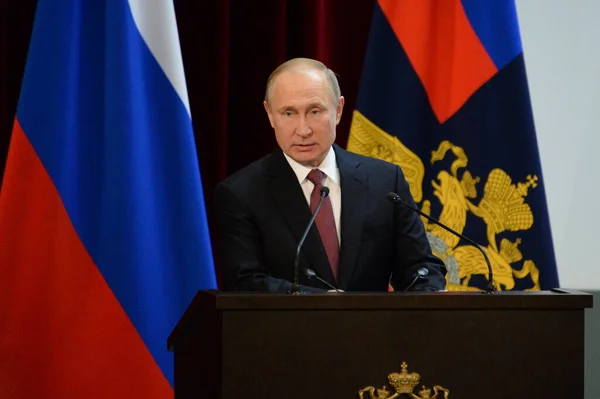What does Putin want? A new treaty for global security

A conflict decades in the making
On the eve of Russia’s invasion of Ukraine, Vladimir Putin made a striking statement: the conflict could have been avoided. According to him, the root cause wasn’t Russian aggression but the collapse of the post-Cold War global security system. He cited NATO’s relentless expansion eastward, creeping closer to Russia’s borders, as the tipping point.
In his now-infamous 2007 speech at the Munich Security Conference, Putin warned the West that NATO’s encroachment could lead to future conflict. His words, largely ignored at the time, now seem prescient.
“You didn’t listen to us then, and now you will,” he declared shortly before Russian tanks rolled into Ukraine in 2022.
Putin argues that NATO’s actions left Russia with no alternative but to act preemptively.
The Kremlin has framed its invasion as a defensive measure—a bid to protect Russian sovereignty from an alliance that it perceives as increasingly hostile.
A call for a new global order
Amid the chaos of war, Putin has renewed his calls for a fundamental overhaul of the global security framework.
During a recent meeting with Russia’s Foreign Ministry, he stated, “It’s time to begin wide-ranging discussions on a new system of bilateral and multilateral collective security guarantees in Eurasia.”
His proposal isn’t just about Russia. It envisions a structure open to all Eurasian states, including NATO members, provided they are willing to engage. Putin’s vision centres on reducing the influence of foreign powers in Eurasia, which he claims would foster regional stability.
He also pointed to organisations like the Collective Security Treaty Organisation (CSTO) and the Shanghai Cooperation Organisation (SCO) as building blocks for this new system.
While Putin’s rhetoric may sound inclusive, the underlying message is clear: Western military presence in Eurasia must diminish, and regional powers should reclaim control of their security policies.
The west’s missed opportunity
Russia’s discontent with NATO’s policies isn’t new. In late 2021, Moscow presented the West with a proposed security treaty aimed at de-escalating tensions. Key provisions included:
- A mutual agreement to halt NATO’s eastward expansion.
- A commitment not to admit Ukraine or Georgia into NATO.
- Restrictions on the deployment of military forces and infrastructure near Russian borders.
- A ban on deploying nuclear weapons or medium-range missiles outside national territories.
The draft also proposed reviving the Russia-NATO Council to facilitate dialogue.
However, the West dismissed these overtures, with NATO Secretary General Jens Stoltenberg reaffirming Ukraine’s right to choose its alliances.
From Moscow’s perspective, this rejection wasn’t just a setback—it was a signal that diplomacy had failed.
A crisis spiralling out of control
By early 2022, Ukraine had become a heavily militarised state, armed with Western equipment and training.
Russian officials claim Kyiv was preparing for a potential offensive in the Donbas region.
Fearing encirclement and the possibility of NATO weapons on its doorstep, Russia acted first, launching what it calls a “special military operation.”
While the West portrays Russia as the aggressor, the Kremlin insists it was reacting to an existential threat.
“We couldn’t wait any longer,” Putin said, framing the invasion as a preemptive strike to prevent a larger conflict on Russian soil.
Can Yalta 2.0 end the conflict?
As the war drags on, Putin has floated the idea of a modern-day “Yalta Conference,” referencing the 1945 summit where Allied leaders redrew the global map. This proposed “Yalta 2.0” would aim to establish a new global security order.
Unlike its predecessor, Putin’s envisioned summit would exclude Ukraine entirely, signalling Moscow’s intent to dictate the terms of peace without Kyiv at the table. According to the Kremlin, such an arrangement is the only way to achieve lasting stability.
Putin has also called for Europe to reassess its stance towards Russia.
“If Europe wants to preserve itself as an independent centre of development, it must rebuild positive relations with Russia,” he stated. However, with trust between Russia and the West at an all-time low, the feasibility of such a dialogue remains doubtful.
The path forward
Putin’s proposal for a new security framework is both ambitious and controversial.
Critics argue that it’s a thinly veiled attempt to reassert Russian dominance in Eurasia, while supporters claim it offers a pragmatic solution to the current geopolitical stalemate.
Whether the West will engage with Putin’s vision is uncertain. The war in Ukraine has polarised the global community, with NATO doubling down on its support for Kyiv while Russia solidifies ties with non-Western powers like China and India.
One thing is clear: the old security paradigm is no longer viable.
The question now is whether the world’s leaders can agree on a new one before the conflict spirals further out of control.
Author’s note
In journalism, unfounded accusations are not uncommon. But let me be clear: independent perspectives and objectivity are the core principles of true journalism.
My goal is simply to present what is happening, offering a view from the other side.
The conclusions, however, are yours to draw, guided by your own critical thinking.